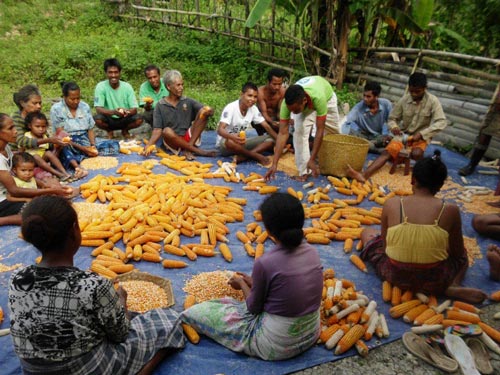 In Timor-Leste, maize is the main staple crop grown by 88% of farming households. However, availability of quality seed of improved maize varieties is a major bottleneck for enhancing crop production and productivity. Experiences gained through the Seeds of Life program within the Ministry of Agriculture and Fisheries (MAF) indicated that there was a significant yield advantage of MAF-released maize varieties over the local varieties under farmer management practices. The MAF recommended an improved open-pollinated maize variety Sele, originally LYDMR (Late, Yellow, Downy Mildew Resistant) introduced by the CIMMYT Asian Regional Maize Program, whose yield is 47% higher than that of traditional maize varieties (average result from 1,091 on-farm demonstrations trials during 2006-10).
In Timor-Leste, maize is the main staple crop grown by 88% of farming households. However, availability of quality seed of improved maize varieties is a major bottleneck for enhancing crop production and productivity. Experiences gained through the Seeds of Life program within the Ministry of Agriculture and Fisheries (MAF) indicated that there was a significant yield advantage of MAF-released maize varieties over the local varieties under farmer management practices. The MAF recommended an improved open-pollinated maize variety Sele, originally LYDMR (Late, Yellow, Downy Mildew Resistant) introduced by the CIMMYT Asian Regional Maize Program, whose yield is 47% higher than that of traditional maize varieties (average result from 1,091 on-farm demonstrations trials during 2006-10).
Annually, Timor-Leste pays at least US$ 1.5 million to service its national maize seed requirements, a large expense for such a small nation. Despite intensive efforts, the supply of MAF-released Sele seed was only 32 tons in 2011 and 89 tons in 2012, which is far below the nation’s total maize seed requirements. To address the maize seed insecurity, the MAF, with support from the Australian Government through the Australian Agency for International Development (AusAID) and the Australian Centre for International Agricultural Research (ACIAR), included community-based seed production (CBSP) in the third phase of the Seeds of Life (SoL3) program. The Centre for Legumes in Mediterranean Agriculture (CLIMA) within the University of Western Australia (UWA) is commissioned to coordinate the Australian-funded activities.
CBSP is a decentralized system of production, storage, and marketing of seeds by organized groups of farmers operating close to their homes as community groups or farmers associations. At the initial stage, the groups or associations received training on seed production, storage, and marketing from extension staff of MAF or NGOs. After gaining experience, these groups continue seed production activities on their own with little or no extension support. The CBSP groups follow basic seed production procedures, produce quality seed for use by group members, and sell or barter any surplus to others in the local community. The SoL3 program currently operates in 11 of the 13 districts of Timor-Leste (45 sub-districts and 135 sucos) through 680 CBSP groups with support from the MAFSoL extension program. Four hundred more CBSP groups are facilitated through collaboration with international NGOs, such as CARE, World Vision, Mercy Corps, Hivos, Catholic Relief Services, and USC Canada. The program not only supports maize seed production by community groups, but also seed production of other major food grains, such as rice and peanuts, as well as plots of improved varieties of cassava and sweet potato.
During the initial year of SoL3, nearly 726 CBSP groups were facilitated by MAF and NGOs. Of these, 320 (99 groups by MAF-SoL and 221 groups by NGOs) were growing Sele maize variety. Each participating group was composed of an average of 15 members, and each group was provided with 5 kg of certified Sele seed, sufficient to plant a 2,000 m2 seed plot. In the initial year of implementation, 289 CBSP groups produced an average of 159 kg of quality Sele seed (totaling 46 tons), while 31 groups suffered total crop failure due to grazing animals. This locally produced seed, stored in airtight 200-liter steel drums, was sufficient to meet the seed requirements of all group members and still leave extra seed for local barter or sale.
CBSP in Timor-Leste has proved to be a cost-effective and sustainable method of achieving local seed security. With further planning and effective implementation, each village, sub-district, and district in Timor- Leste could potentially achieve local seed security, a necessary prerequisite for maize food security of Timor-Leste.
 Innovations
Innovations